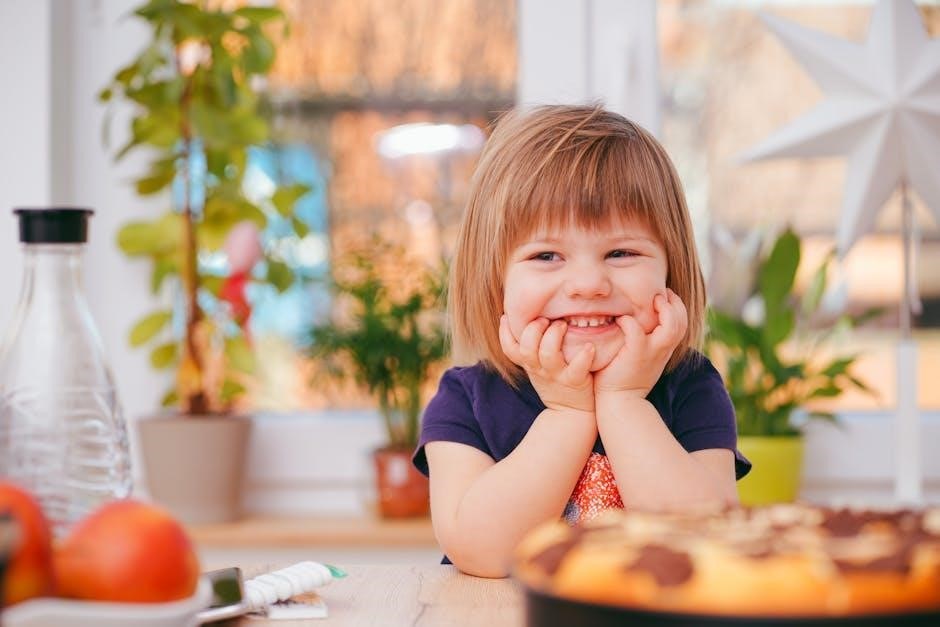
Kindergarten readiness ensures children are prepared with essential physical, language, and social skills, supported by checklists that guide parents and teachers in fostering a smooth transition to school.
Understanding the Importance of Readiness Checklists
Kindergarten readiness checklists are essential tools for assessing a child’s preparedness for school. They provide a clear framework for evaluating physical, language, and social skills, helping parents and educators identify strengths and areas needing improvement. These checklists guide parents in preparing their children effectively and ensure teachers understand individual needs. By using a readiness checklist, families can foster a smooth transition to kindergarten, setting the foundation for future academic success and confidence.
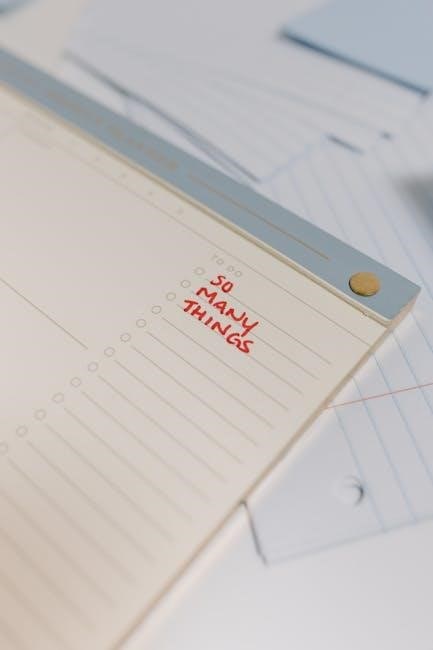
Physical Skills Development
Physical skills, including fine motor abilities like drawing and cutting, are crucial for kindergarten readiness. These skills enhance dexterity, coordination, and the ability to perform academic tasks effectively.
Fine Motor Skills: Drawing, Cutting, and Writing
Fine motor skills, such as drawing, cutting, and writing, are essential for kindergarten readiness. These activities enhance hand-eye coordination and dexterity, preparing children for academic tasks. Using scissors to cut shapes and drawing simple forms build precision. Writing their name and recognizing letters are foundational skills. Checklists often include these milestones to assess readiness. Encouraging daily practice with crayons, pencils, and safety scissors helps children master these abilities, ensuring confidence and success in classroom activities.
Gross Motor Skills: Running, Jumping, and Balance
Gross motor skills like running, jumping, and balance are vital for kindergarten readiness. These abilities enhance physical coordination and overall mobility. Children should demonstrate stability while standing on one foot and confidence in moving their bodies. Activities such as hopping, skipping, and climbing further develop these skills. Checklists often assess these milestones to ensure children are physically prepared for active play and classroom participation, fostering independence and physical confidence.
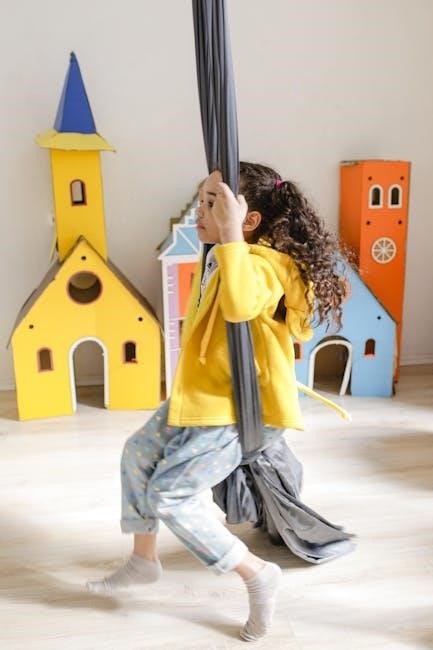
Language and Communication Skills
Language skills are crucial for kindergarten success, including speaking in sentences and identifying letters. Checklists help assess these abilities, ensuring children communicate effectively and understand basic literacy concepts.
Verbal Communication: Speaking in Sentences
Verbal communication is a cornerstone of kindergarten readiness. Children should speak in complete sentences, express thoughts clearly, and engage in conversations. This skill is assessed in readiness checklists to ensure they can convey ideas effectively. Parents and teachers use these tools to identify strengths and areas needing support. Encouraging daily conversations and storytelling at home helps build confidence and fluency in young learners, preparing them for classroom interactions and social success.
Understanding and Identifying Letters and Words
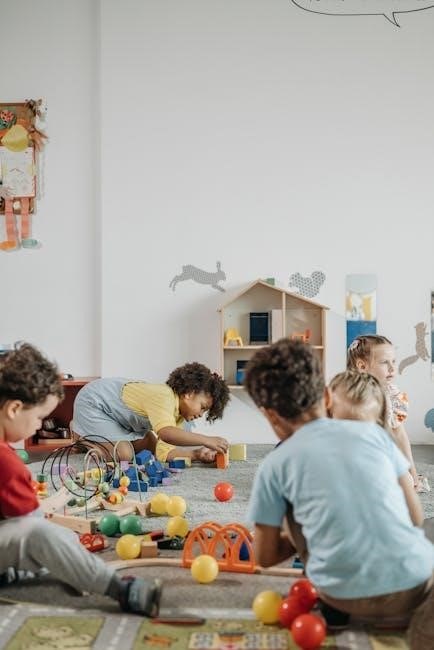
Recognizing letters and words is a key component of kindergarten readiness. Checklists often include skills like identifying uppercase and lowercase letters and understanding their sounds. Children should also demonstrate an awareness of basic word structures, such as recognizing their name in print. Parents can support this by reading together and pointing out letters in their environment. These foundational literacy skills are crucial for early reading development and academic success in the coming years.
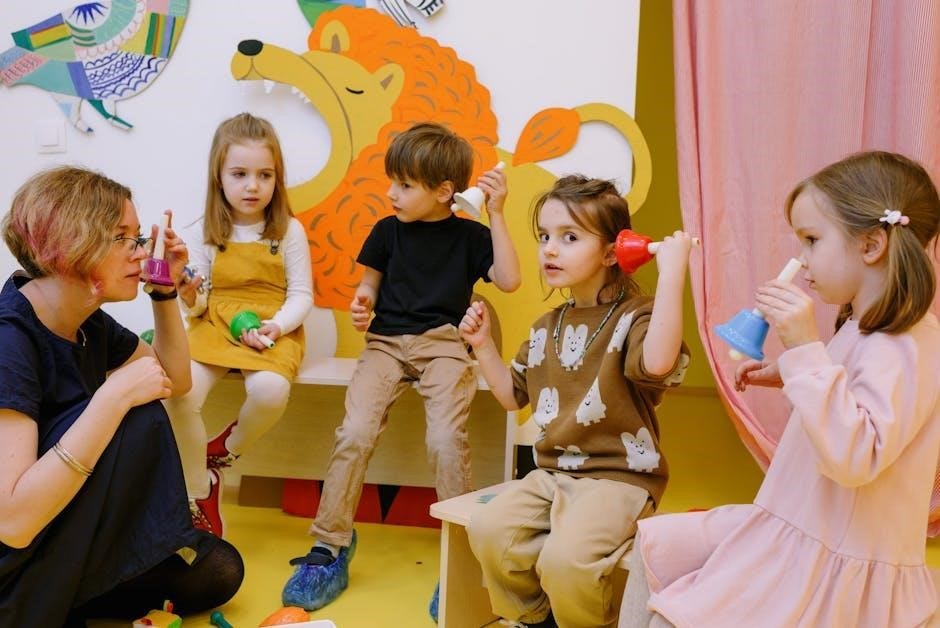
Social-Emotional Development
Social-emotional readiness involves cooperation with peers, managing emotions, and showing empathy. Checklists highlight these skills, preparing children for classroom interactions and emotional resilience in a school setting.
Self-Help Skills: Dressing and Using the Bathroom Independently
Mastery of self-help skills, such as dressing and using the bathroom independently, is crucial for kindergarten readiness. Checklists often include tasks like putting on coats, zipping, and buttoning. These abilities promote confidence and reduce reliance on teachers, allowing children to focus on learning. Encouraging practice at home helps build these essential life skills, ensuring a smoother transition to school life and fostering independence from an early age.
Interpersonal Skills: Cooperating with Peers and Adults
Developing interpersonal skills is vital for kindergarten success. Checklists highlight the ability to cooperate with peers and adults, share materials, and take turns. These skills foster positive classroom interactions and teamwork. Encouraging group play and modeling respectful communication at home can strengthen these abilities. Strong interpersonal skills help children build friendships and adapt to classroom routines, ensuring a positive social-emotional foundation for their academic journey and lifelong relationships.
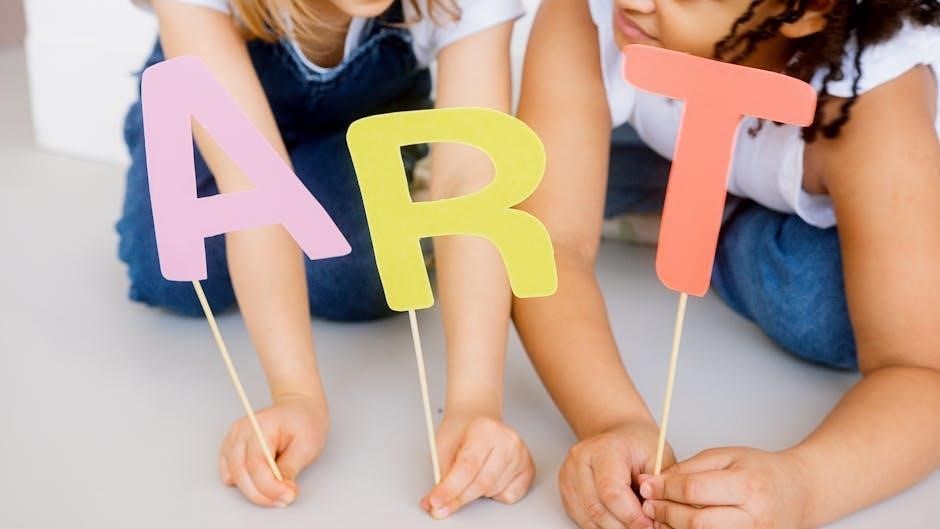
Cognitive and Academic Readiness
Cognitive skills like counting, recognizing shapes, and identifying letters are foundational for kindergarten success. Checklists emphasize these abilities, ensuring children are academically prepared for the classroom environment.
Mathematical Awareness: Counting and Basic Shapes
Mathematical awareness is a cornerstone of kindergarten readiness, focusing on counting up to 20, identifying basic shapes like squares and circles, and understanding number concepts. Checklists assess these skills, ensuring children can recognize and name shapes, count objects, and demonstrate an understanding of numbers. These foundational abilities prepare children for basic math concepts, such as sorting, patterns, and problem-solving; Mastery of these skills builds confidence and provides a strong base for future academic success in mathematics.
Problem-Solving and Curiosity
Kindergarten readiness checklists emphasize the importance of problem-solving skills and curiosity. Children should demonstrate an ability to approach problems thoughtfully, explore objects, and ask questions. They should also show persistence in solving simple puzzles or challenges. Curiosity is fostered through activities that encourage exploration and critical thinking. These skills help children develop confidence and lay the foundation for lifelong learning, enabling them to adapt to new situations and think creatively in academic and social environments.
Why Kindergarten Readiness Checklists Matter
Kindergarten readiness checklists guide parents and teachers in identifying essential skills, ensuring children are prepared for school and highlighting areas needing support for a smooth transition.
Guiding Parents in Preparation
Kindergarten readiness checklists provide parents with a clear framework to prepare their children, identifying key skills and areas for improvement. These tools help families focus on essential abilities, such as language, motor skills, and self-care, ensuring a strong foundation for school. By addressing gaps early, parents can foster confidence and readiness, creating a smoother transition for their child. Checklists empower parents to take an active role in their child’s development, tailoring activities to meet individual needs and build a lifelong love for learning.
Helping Teachers Assess Student Needs
Kindergarten readiness checklists enable teachers to assess incoming students’ skills, identifying strengths and areas needing support. These tools provide insights into language, motor, and social abilities, helping educators tailor instruction to individual needs. By evaluating readiness, teachers can create personalized learning plans, ensuring each child receives appropriate challenges and support. Checklists also facilitate communication with parents, fostering a collaborative approach to early education and setting a strong foundation for future academic success.
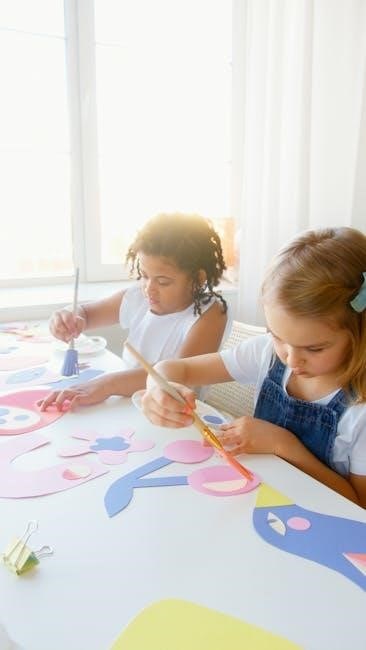
Preparing Your Child at Home
Engage your child in daily educational activities and encourage independence by practicing self-help skills like dressing and using the bathroom, fostering readiness for kindergarten;
Engaging in Educational Activities Daily
Consistency is key to preparing your child for kindergarten. Incorporate daily educational activities like puzzles, alphabet tracing, and counting games to build foundational skills. Reading together fosters language development and curiosity. Encourage hands-on learning through crafts and simple math exercises. These activities not only enhance cognitive abilities but also promote a love for learning. Make it fun by turning tasks into games, ensuring your child stays engaged and motivated. Regular practice helps create a strong academic and social foundation for their upcoming school journey.
Encouraging Independence and Responsibility
Encourage your child to take ownership of simple tasks, such as putting away toys or dressing themselves. Teach them to use the bathroom independently and manage personal belongings. Assign age-appropriate chores, like setting the table or feeding a pet, to foster responsibility; Praise their efforts to build confidence and self-esteem. Consistency and positive reinforcement will help your child develop essential life skills, preparing them for the expectations of kindergarten and beyond.
Kindergarten readiness checklists provide valuable insights, helping parents and educators ensure children are well-prepared emotionally, socially, and academically for a successful school experience.
Final Tips for a Smooth Transition
To ensure a seamless start, encourage open communication with teachers and maintain a consistent routine. Engage your child in educational activities daily and foster independence. Emotional support and positive reinforcement will build confidence. Use readiness checklists to identify and strengthen skills, focusing on areas like language, self-help, and problem-solving. Celebrate small achievements and stay involved in their learning journey. A well-prepared child will thrive in kindergarten, setting the foundation for future academic success.